“I’ve got the experience. I’ve won tough cases. So why is my pipeline dry?”
If that question keeps you up at night, you’re not alone, and your skills are not the problem.
When people search for a lawyer nearby, does your firm appear at the top of Google?
That’s where the clients are! 46% of all Google searches have local intent, meaning TONS of potential clients are looking for a lawyer right now in your area.
In 2026 and beyond, local SEO for lawyers is your ticket to seizing those valuable calls and consultations.
Today, we’re breaking down 10 proven local SEO tactics to fill your pipeline and grow your firm.
What Is Local SEO for Law Firms
Let’s do a quick experiment. Google “(your practice area) lawyer in (your city)” — for example, “family lawyer in Tampa.”
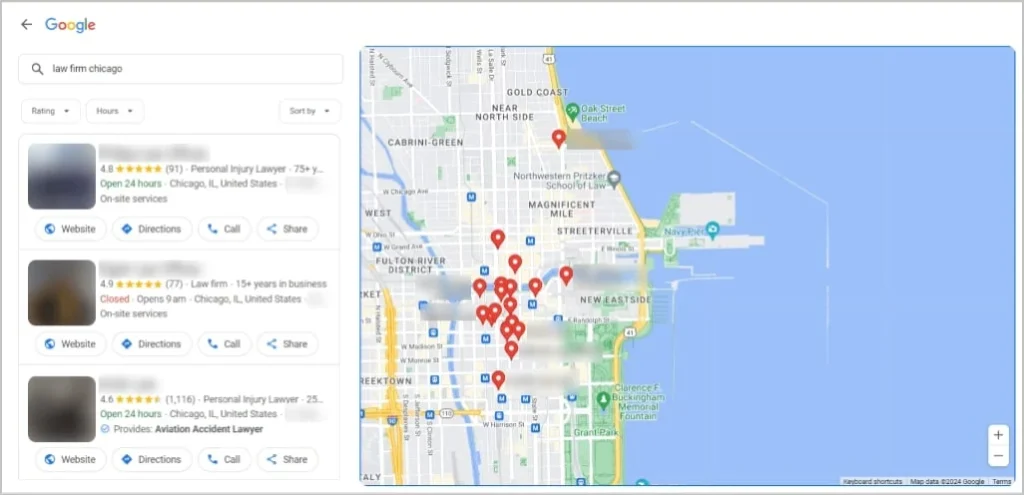
Do you show up? If not, you desperately need local SEO.
What is local SEO for lawyers? Local search engine optimization is how law firms like yours dominate “near me” searches. They optimize their Google Business Profile, reviews, citations, reputation, and their law firm’s website to appear in local search results.
Remember, 97% of people go online to learn more about a local business. If your firm isn’t showing up when and where clients search… well, no one will find you.
Master Google’s three local SEO ranking factors (proximity, relevance, and prominence) and your firm will be the first one they call.
Partner with a legal SEO agency to take the load off your shoulders and focus on doing what you love: helping your clients.
Why Local SEO for Attorneys Is the Key to Higher ROI
Most client journeys start the same way — with a Google (or ChatGPT) search.
Whether it’s “DUI lawyer near me” or “family attorney in Chicago,” your next prospect is already online… anxious, desperate, and researching who to call!
You need local SEO for attorneys to amplify your visibility and get in front of those eyeballs. Here are just a few benefits of local SEO for law firms:
- Attracts qualified local leads – Get found by high-intent clients searching nearby.
- Builds credibility fast – Strong reviews and map visibility make your firm the obvious choice.
- Outperforms bigger firms – Rank higher locally without a massive ad spend.
- Tracks measurable ROI – See exactly what’s driving calls and cases.
Remember, your local visibility hinges strongly on local SEO for attorneys, and it should be the very first thing you do.
How to Improve Your Local Ranking on Google
Now that you know what local SEO is… it’s time for action!
Whether you’re DIY-ing or partnering with a local SEO agency, follow these 10 steps and grow without the trial-and-error.
1. Optimize Your Law Firm Google Business Profile to Get Found First
Before anyone visits your website, they’re checking your Google Business Profile (GBP).
It’s that little “box” on Google with your map, reviews, hours, and contact info.
Firms with a complete GBP are 2.7x more likely to be seen and trusted! If your GBP isn’t verified and optimized, you’re practically invisible to clients who are ready to hire.
Add these to your local SEO campaign to-do list:
- Claim and verify your profile: Search your firm’s name on the GBP website, click “Own this business?”, and complete verification.
- Write a client-first description: Try something specific like: “We help Austin families create wills that protect their legacy.”
- Pick precise categories: Go beyond “Law Firm.” Use Personal Injury Attorney, DUI Lawyer, or other practice-specific terms.
- For multi-location firms: Create a unique, verified GBP for each office with consistent NAP (Name, Address, Phone).
- Stay active: Post weekly updates, case wins, or FAQs to boost engagement and credibility.
- Use local SEO tools for lawyers: Track performance, monitor reviews, and keep your profile ranking high in local search.
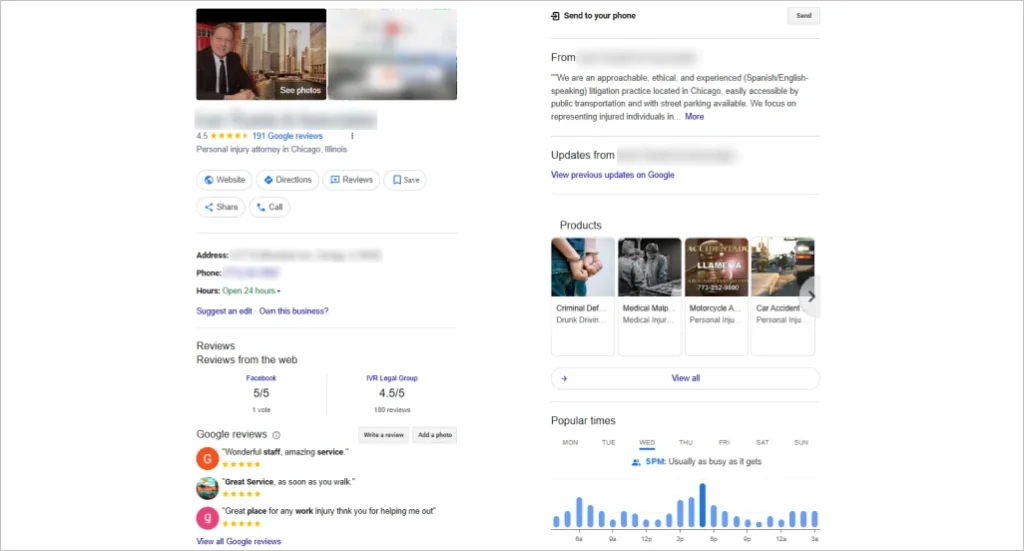
Skip this step and you’ll be severely handicapping your SEO success… and your connection to your best prospects!
2. Create a Local Keyword Strategy to Rank Higher in Search Results
It’s frustrating to build a website and realize the wrong people — or no one at all — are finding it. Ugh!
The problem isn’t your practice; it’s your keyword strategy. Here’s how to fix it:
- Keyword research: Start with geo-modified keywords. Combine your service + location (e.g., “probate attorney near me,” “estate planning lawyer Dallas”).
- Use tools like Semrush, Google’s Keyword Planner, or Google autocomplete to find what clients are actually typing.
- Focus on search intent: More clicks don’t always mean better leads.
- “Trust lawyer” attracts browsers, but “best trust lawyer in Arizona” signals someone ready to hire.
- Categorize keywords by intent: researching, comparing, or hiring.
- Match keywords to the right pages: Don’t stuff everything on your homepage.
- “DUI attorney [county]” → DUI Defense page
- “Criminal defense lawyer in [city]” → Homepage
- “Felony defense attorney [city]” → Felony Defense page
- Use long-tail local keywords: They have lower search volume but attract serious clients:
- “How long do I have to file a personal injury claim in [city]?”
- “What to do after a slip and fall injury in [state]?”
- Address these in blogs, FAQs, and service pages to boost visibility and trust.

Your keyword strategy is crucial, whether you run a personal injury law firm or an immigration firm. It ensures you pop up where (and when) prospects are ready to hire legal assistance.
3. Use On-Page SEO to Boost Your Website’s Rankings
Now, it’s time to pack a punch on your website!
On-page SEO is your hand-dandy partner in crime. This puts your website on the first page of Google’s organic search results (and even inside AI tools like ChatGPT)! Here are our top tips:
- Optimize your title tags and headings: Use geo-specific phrases like “Immigration Attorney in Austin | Smith & Rogers Law.” Keep your H1s and H2s natural, clear, and location-focused.
- Write meta descriptions: These 160-character blurbs may not affect rankings, but they do boost conversions. Add local keywords and a CTA — e.g., “Need a trust attorney in Atlanta? We help Georgia families protect what matters.”
- Link pages strategically: Connect main practice pages to city-specific ones (e.g., “Family Law in La Jolla”) to improve site structure and SEO across locations.
- Show local relevance with images: Replace generic stock photos with real office or team images, and use keyword-rich alt text like “Criminal defense attorney in Tulsa office.”
- Add schema markup: Schema (structured data) helps Google display your firm with trust-boosting details in search results.Use LegalService and LocalBusiness schema types to earn rich snippets. Free tools like Schema.org, Google Rich Results Test, or RankRanger Schema Generator make it easy.

You’re doing great with your SEO efforts — your foundation is strong, your pages are optimized, and your visibility is growing!
Ready to keep that momentum going? Let’s tackle the next step.

Rank Higher with Pro-Level SEO.
SEO is complex and time-consuming. Leave it to Comrade. We deliver massive returns for our clients, soaring to 800%!
4. Create Location-Specific Content
Does your website actually sound local… or could it belong to a firm anywhere?
That’s the difference location-specific content makes. It shows clients (and Google) that you’re their local expert who understands the courts, laws, and issues where they live.
Here’s how to position yourself as a local pro using local SEO strategies:
- Build city-focused pages: Tailor each to your specific location. Mention local courts or laws, add your office map and phone number, and use CTAs like “Schedule a consultation in our [City] office.”
- Publish local legal guides: Answer real, city-based questions: “How long does probate take in Illinois?” or “What are tenant rights in Denver?” These rank well and build authority.
- Show up in your community: Share stories about local events, charities, or awards to build trust and relevance.
- Comment on local news: When new laws or cases make headlines, give your take. It positions you as the local voice clients can rely on.
- Share local case studies: Show how you’ve helped real people in your area — it makes your expertise tangible.
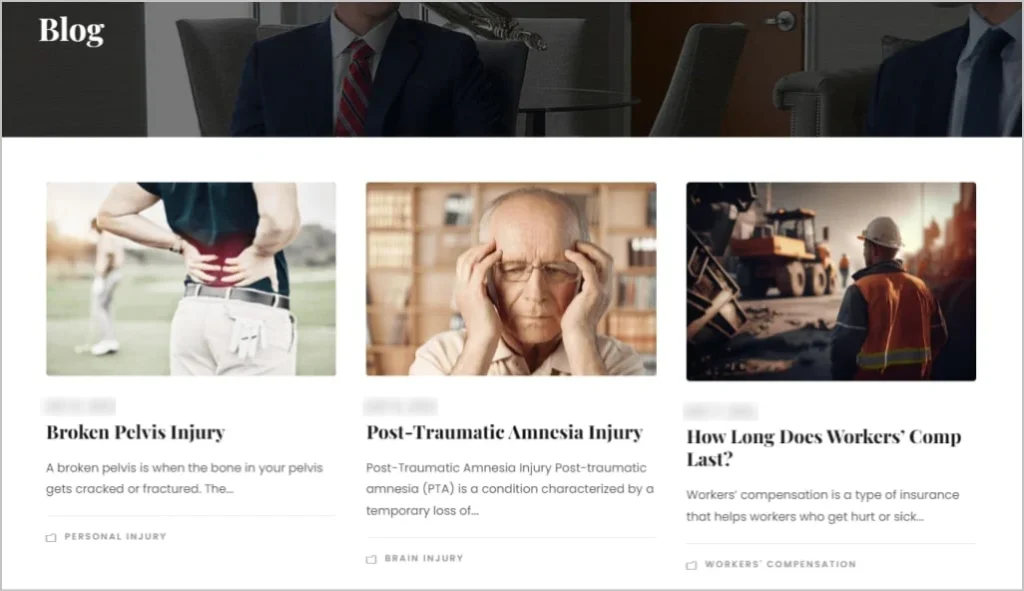
Make your firm feel like part of the community you serve, and the community will give you your best clients.
5. Earn High-Quality Local Backlinks for Long-Term Authority
Google doesn’t just care what you say about your law firm. It cares who else is saying it.
Earning local backlinks and building out trusted directory listings are crucial for your firm’s long-term authority and visibility.
Start with the top legal directories that prospects and Google already trust:
| Directory | Domain Authority (DA) | Why It Matters |
|---|---|---|
| Avvo | 74 | Client-facing reviews and attorney Q&A build credibility and exposure. |
| Justia | 90+ | Excellent for ranking local practice pages in search. |
| FindLaw | 87 | Strong backlink authority and high Google visibility. |
| Lawyers.com | 88 | Trusted by consumers researching legal representation. |
| Martindale-Hubbell | 74 | Long-standing reputation and peer-review credibility. |
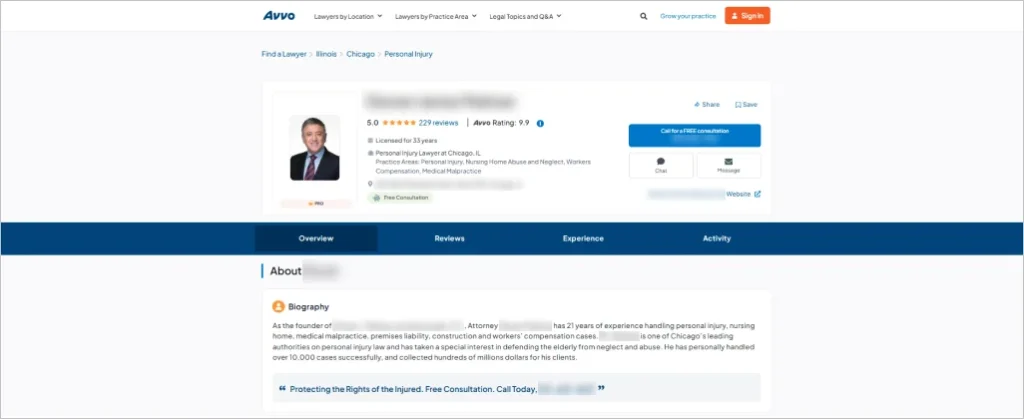
Optimization tips:
- Keep your NAP (Name, Address, Phone) consistent across all national and local business listings.
- Treat each profile like a mini landing page — include a professional headshot, detailed service descriptions, credentials, and reviews.
- Update regularly to stay active and relevant in local search results.
Beyond directories, you can earn local backlinks in the legal industry:
- Offer expert commentary to local press and blogs on new laws or high-profile cases.
- Launch community scholarships or initiatives — these naturally attract links from schools, nonprofits, and local media.
Even one strong local mention in YourCityNews.com can outperform a dozen low-quality backlinks — authority beats quantity every time.
Not sure where to get started? Check out the top 20 legal directories for lawyers in 2026.
6. Strengthen NAP Consistency and Build High-Value Citations
Have you ever called a business only to find out the number was wrong? Or visited and found out they’d moved to a different address? Frustrating, right?
That’s why your NAP (Name, Address, Phone) must be consistent everywhere. Here’s how to lock it in:
- Choose one official version of your firm’s name, address, and phone. Use it exactly across your website, Google Business Profile, directories, and social channels.
- Run a citation audit, especially for long-established firms. Look for outdated numbers, misspellings, different abbreviations, or duplicate listings. Tools like BrightLocal, Whitespark, or Moz Local can help streamline the process.
- Update local listings far and wide — not just legal directories. Make sure platforms like Yelp, Bing Places, Apple Maps, Facebook, BBB, and local business associations all show the same NAP.
- Leverage data aggregators (e.g., Data Axle, Foursquare, Localeze) as your syndication hubs. Claim your listings there and ensure your core NAP data is correct — because errors there echo across hundreds of smaller directories.
Fixing NAP consistency isn’t glamorous, but it’s foundational for local search engine optimization. A clean, unified presence keeps Google happy and is sure to attract local clients.

Get More Leads By the Day.
With top-tier SEO at Comrade, you could see up to 1,018% more leads and grow faster than ever.
7. Get More Client Reviews to Boost Local Search Performance
Did you know 84% of people trust online reviews as much as personal recommendations?
For law firms, 4- and 5-star reviews are a top local search ranking factor. They’re essential for your visibility, credibility, and conversions.
Here’s how to collect them:
- Ask ethically: Skip the gift cards and incentives. Instead, ask for reviews naturally — after a successful case or consultation. Keep these warm and simple.
- Respond like everyone’s watching:
- Thank clients personally for positive reviews — it reinforces trust.
- Handle negative reviews calmly: “We’re sorry to hear about your experience. Please reach out directly so we can make things right.”
Nearly 89% of consumers read business responses, so your tone matters.
- Monitor reviews across platforms: Don’t stop at Google. Track feedback on Avvo, Justia, FindLaw, Facebook, and Lawyers.com using tools like BirdEye, Reputation.com, or Google Alerts.
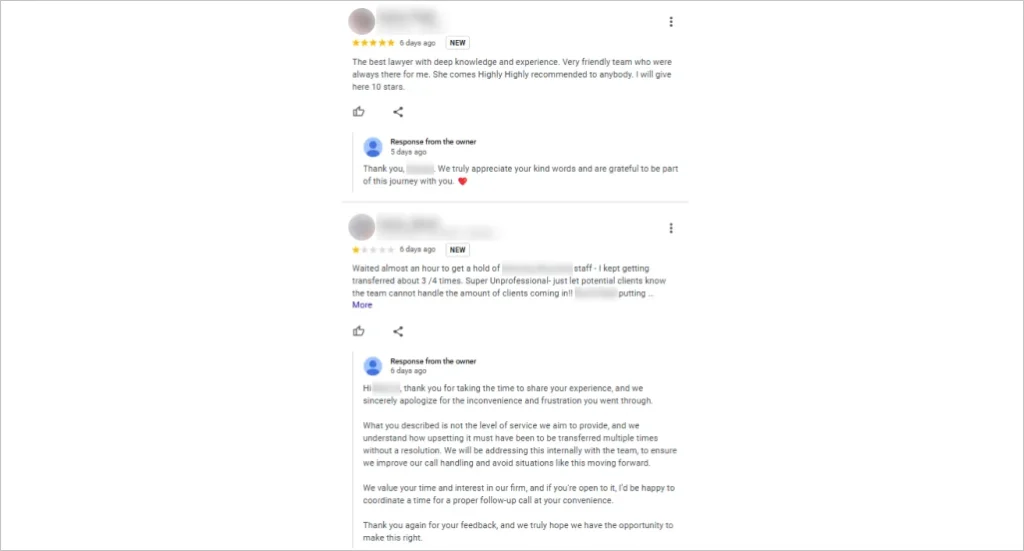
Consistent, authentic reviews are like rocket fuel. They push your firm higher in local search engine results pages, and make you the obvious choice for new clients.
8. Leverage Social Media to Increase Local Engagement
Google’s not the only hotspot in town.
Your next client might scroll past your face on Facebook or see your firm tagged in a local event post.
In 2026, use social media for law firms to build that local trust. Here’s how to make it work:
- Choose the right platforms: Focus on where your audience actually is.
- Facebook for local community engagement and visibility.
- Instagram for behind-the-scenes and visual storytelling.
- LinkedIn for professional networking and B2B connections.
- Post local: Use your city’s name in captions and hashtags, comment on local issues, and tag nearby businesses or events. Geo-targeted content helps the algorithm — and your audience — recognize you as part of the community.
- Be active, not just promotional: Join local Facebook or Nextdoor groups, answer questions (ethically), share checklists, and support local causes.
- Highlight real-world involvement: Promote local events you sponsor or attend, share photos, and post thank-yous afterward.
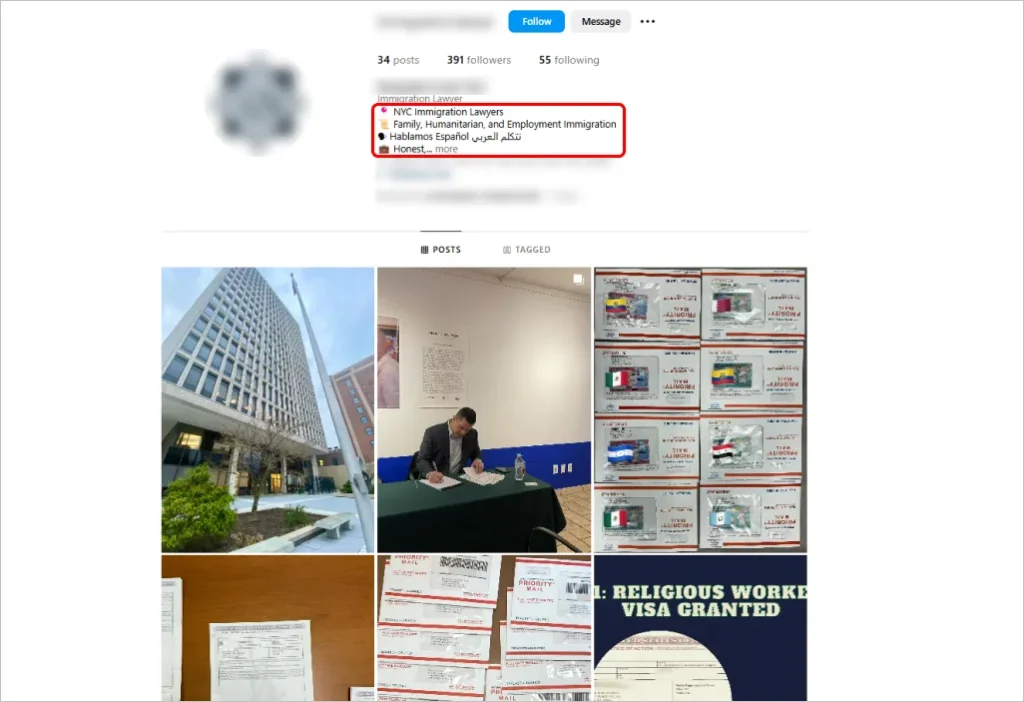
When people see you showing up (online and offline), you stop being “just another lawyer” and start becoming a trusted local pro.
Think social media is a waste of time for your law firm? Think again.
Learn how small firms can attract clients without burning their budget in our social media guide for lawyers.
9. Use Google Screened & LSAs to Expand Your Law Firm’s Reach
Want your firm to appear above the map pack on Google?
Try Google Screened and Local Services Ads (LSAs) — two of the most powerful tools in local SEO marketing for lawyers!
Here’s what you need to know:
- What Google Screened is: A verification program by Google that confirms your firm’s legitimacy before showcasing it to potential clients.
- Verification steps include:
- License and insurance checks
- Background verification for firm owners or partners
- Proof of professional credibility and client trust
- Where LSAs appear: Right at the top of Google results — above both paid ads and the Local Pack — complete with the green checkmark badge for verified firms.
- Why it matters: That badge instantly builds trust and helps you attract more high-intent leads in your area.
- Bonus: Even without running paid ads, getting Google Screened improves your credibility and local visibility.
Apply or learn more through Google Local Services Ads for Lawyers.
Is the effort worth it? Well, the average conversion rate for legal search advertising is ~7% and that includes LSAs, so we’d say, yes!
You’re busy, and backlinks don’t build themselves. We can help!
Our team of experts will build you a robust backlink profile to bring you major visibility on Google. More visibility = more clients. Contact us to get started.
10. Use Sponsorships and Events to Expand Local Authority
Lastly, let’s talk about community engagement! You don’t need to sponsor the city marathon to make an impact.
Even small community events (like school fundraisers, nonprofit galas, or local lectures) can massively boost your visibility and credibility.
Here’s how to tap into that kind of local involvement:
- Sponsor or participate in local events: Donate to auctions, sponsor a youth team, or buy a table at a charity dinner. If the event lists your firm on its website, that’s a valuable backlink and a trust signal for Google.
- Collaborate with nearby organizations: Partner with local businesses, real estate firms, healthcare providers, or nonprofits on joint guides, Q&A posts, or community panels.
- Request a link in return: Ask to be featured on their website’s “Resources” or “Partners” page — an easy, legitimate way to earn a high-quality local backlink.
Remember, authentic community engagement shows both Google and your neighbors that your firm is invested where it matters most — right here in your community.

Go Local & Fill Your Pipeline.
Comrade gives you an edge. Our SEO and PPC drives more leads, more clients, and a 400% to 800% ROI. Want that kind of success?
Do-It-Yourself SEO or Hiring a Local SEO Agency?
You know local SEO matters… but should you DIY or bring in a local SEO agency?
Here’s the reality: effective SEO isn’t a one-time checklist. It’s an ongoing mix of strategy, content, optimization, and tracking.
And after a full day in court or client meetings, you probably don’t have time to double as your own SEO strategist.
It’s better to hire a legal SEO agency. You get a team that already knows what works for law firms — from ranking on Google Maps to driving qualified leads.
While you focus on winning cases, your attorney SEO team focuses on winning clients.
Seize More Leads with Local SEO for Law Firms!
Right now, someone in your city is searching for legal help.
The question is — will they find you or your competitor already investing in local SEO for lawyers?
At Comrade, we leverage local SEO services to make sure clients find you first!
With 18+ years of experience and a track record that has proven itself 100x times over, we know what it takes to win clients in highly competitive metros.
You could (finally!) steady your pipeline and focus on growing your business.
Many of our lawyer SEO clients see a 400% to 800% ROI. Ready to join them?
